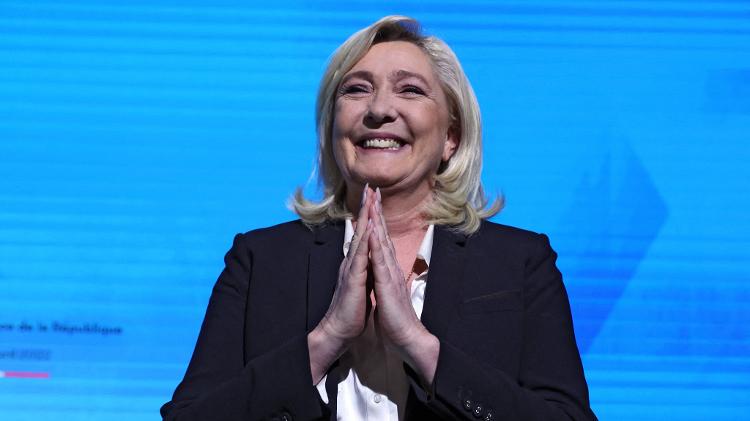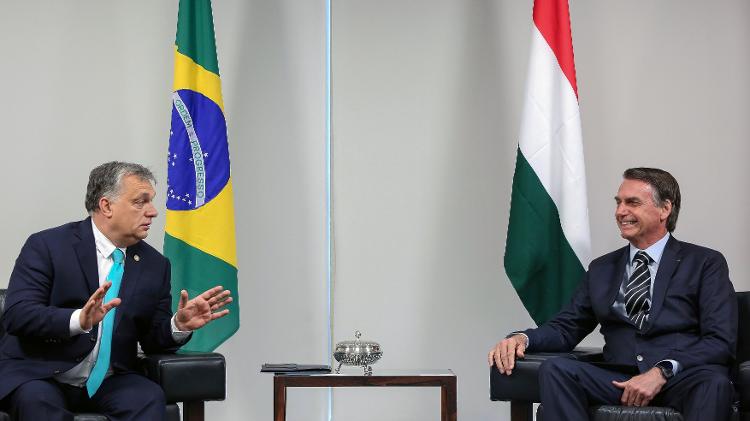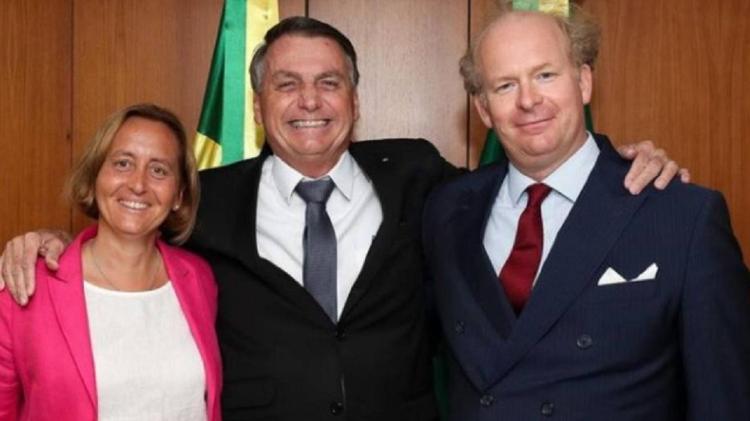President Jair Bolsonaro’s (PL) main allies in Europe are accused of taking funds from Russian President Vladimir Putin for election campaigns or political movements. In Italy, Germany, Spain, France or Hungary, far-right groups have been criticized and questioned for their ties to the Kremlin.
Italian Matteo Salvini, one of Bolsonaro’s main allies in Europe, is one of them. The two leaders were together in November 2021, when Brazil visited their ancestral city in northern Italy.
Salvini’s shirt
In early March, as the war raged, Salvini visited a Polish city on the Ukrainian border to support Ukrainian refugees.
But his journey turned into a disaster. Welcomed in the city of Przemysl, the Italian was surprised by an unexpected gesture. The local mayor gave the leader of the Italian far-right a gift: a T-shirt with Vladimir Putin’s face and the words “Putin’s Army” in Russian.
The shirt was the same one Salvini wore on Red Square in Moscow in 2014. “We want to go with you to the border and a refugee reception center, so you can see for yourself what your friend Putin did to all these people who crossed the border, about 50,000 people a day,” cried the mayor, angrily. Salvini walked away as he was called “clown, jester” by the locals.
The sound of meeting with the Russians
In 2019, the website Buzzfeed News launched a deep crisis in Italian politics by broadcasting the audio of a meeting between the chief aides of Salvini, who was then deputy prime minister of Italy, and representatives of Putin. The meeting took place in October 2018 in Moscow. There was a “grand alliance” negotiation on the agenda.
Officially, an agreement on oil will be negotiated. But, according to the publication, “the real aim was to undermine liberal democracies and shape a new nationalist Europe aligned with Moscow”.
What Salvini’s Personal Assistant Said
One of the interlocutors at the meeting is Gianluca Savoini, Salvini’s former spokesperson, personal assistant and director of a pro-Russian cultural association. This is the starting point for the discussion:
“It is very important for Europe to change in this historic geopolitical period. Next May will be the European elections. We want to change Europe,” he says.
“A new Europe must be close to Russia as before, because we want to have our sovereignty. We really want to decide for our future, for the Italians, for our children. It is not up to the decision of the enlightened. Brussels of the USA. decide. “
Auxiliary then quotes Salvini and his European allies. “Salvini is the first man to want to change the whole of Europe. Together, our allies, colleagues and other parties in Europe. In Austria Freiheitliche Partei Österreichs (Austrian Freedom Party), Alternative for Germany (Alternative for Germany), Madame Le Pen, and other countries are the same, with Orban we have Hungary, Sweden Sverigedemokraterna (Swedish Democrats) Allies. We really want to start a great alliance with these parties that are pro-Russian, but not for Russia, not for Russia, not pro-Russian for our countries.”
In the recording, the interlocutors point to the terms of an agreement to secretly channel tens of millions of dollars of Russian oil to Russia’s party. salviniNorthern League.
Salvini refused to take money from the Russians in the days following the revelations. “I have never received a ruble, a euro, a dollar or a liter of vodka from Russia as financing,” Salvini said. In power, he tried to bring Italy closer to Russian President Vladimir Putin and made several visits to Moscow. “Salvini has a warm attitude towards our country,” said the Kremlin chief.
Behind the scenes of the meeting
The 75-minute meeting discusses a possible deal involving a Russian company that sells oil worth about $1.5 billion. A discount will be applied so that the League can pocket some of the difference. But Buzzfeed insists that the audio does not provide evidence that the transaction was already confirmed at the time.
Still, the report insists, “the record reveals how far both sides are willing to go to hide the fact that the real beneficiary of the deal will be Salvini’s party – a violation of Italian electoral law that prohibits political parties from accepting large votes in foreign donations – himself and his family.” despite the relief that other European far-right leaders have publicly displayed their pro-Kremlin political sympathies.”
In fact, in the speech, Salvini is enthusiastically described by Russians as “European Trump”.
The day before the meeting, he made a speech denouncing the sanctions against Russia as “economic, social and cultural madness” before meeting with Russian Deputy Prime Minister Dmitry Kozak and Vladimir. Addition, Strong member of Putin’s party, United Russia.
According to the report, the audio recording “provides the first tangible evidence of Russia’s covert attempts to finance European nationalist movements, and the obvious complicity of some high-profile far-right figures in these attempts.”
Million Euros to Marine Le Pen
It was France’s far-right candidate Marine Le Pen who had to explain herself. He finished the election last weekend with a record vote and 42% support. But it wasn’t enough to topple Emmanuel Macron.
Days before the vote, his party admitted that it had paid 12m euros from a Russian-Czech bank. The amount will be the settlement reached due to the 9.4 million euro loan he received in 2014.
The first Czech-Russian Bank was acquired by the aviation company Aviazapchast JSC. At the time, he claimed that he was forced to seek funds in Moscow due to the refusal of French banks to lend to his act.
But in 2020, Aviazapchast entered the list of companies under US sanctions for selling weapons to Iran, North Korea and Syria.
Marine Le Pen has never hidden her admiration for Putin and has made five official visits to the country since 2013. One of the most controversial took place weeks before the 2017 election, where he was second. In the photographs and statements he gave to the press, Putin made it clear that he sees the French woman as the representative of “a growing movement in Europe”.
Revenge was obvious. Deputies of Le Pen’s party undertook the defense of Moscow in the debates in the European Parliament.
In 2014, his father’s party, Jean Marie Le Pen, took out a €2 million loan from a Cyprus-based offshore company. According to an investigation by the Mediapart website, the company had relations with a former KGB agent linked to Russian oligarchs.
In 2017, Marine Le Pen took advantage of this situation as she sought a loan from her father’s party for that year’s election campaign.
Everything changed with the revision of the laws in 2017 and it became clear that non-European banks could not finance their election campaigns. From then on, Le Pen began betting on a relationship with Hungary, a staunch ally of Putin in Europe.
“Brother” Orban
Indeed, over the past decade Hungary has become one of Putin’s main defense platforms in Europe. The country’s prime minister, Viktor Orbán, has been called “my brother” by Bolsonaro, and both have forged alliances on issues such as the defense of the family, Christianity and gender.
But Orbán also became the first European leader to break from a common EU position and welcome Putin in Budapest after the annexation of Crimea in 2014.
That same year, his government selected Russian state-owned Rosatom to replace Hungary’s only nuclear power plant, worth 12.5 billion euros. For this, the Russians themselves would take out loans on generous terms of 10 billion euros, which must be repaid in just 21 years from 2026.
The EU blocked the project for years, claiming that the Hungarian tender was not made to Brussels standards and that Vnesheconombank, the bank involved in the project, was subject to sanctions.
But in 2017 the EU gave up and granted permission for the study, which caused anger in the Hungarian opposition. In fact, Zoltan Illes, a former MP for Orbán’s Party, warned that the financing of the facility is “camouflage” and that Putin’s aim is to “buy influence”.
Despite radically different backgrounds, Orbán and Putin share clear ideas about illiberal democracy, defend pseudo-Christian values, and insist that sovereignty should be valued. But both use the West as an argument that their governments are under threat.
Alternative for Germany and grandson of Hitler’s minister
Another country that pays special attention to Putin is Germany. The Kremlin is accused by political forces in Berlin of being one of the main supporters of the far-right Alternative for Germany (AfD) party.
One of the representatives of the movement, Beatrix von Storch, is the granddaughter of one of Adolf Hitler’s most important ministers, and was received last year by President Jair Bolsonaro and major figures of Bolsonarism in the country. In Europe, however, the party is under suspicion because of its ties to the Kremlin.
According to the File Center in London, Moscow has mapped out far-right lawmakers who can help defend the Kremlin’s interests in Europe. One of them was Markus Frohnmaier of the AfD. An April 2017 document states who will need support while Frohnmaier is still a candidate, as a potential ally, and in the election.
In the same document, the Russians state what the result of their assistance to the politician will be: “We would be completely under the control of our own deputy in the parliament”. Frohnmaier became one of the lawmakers critical of the sanctions against Russia and visited Moscow’s annexed Crimea in 2014.
The File Center is funded by Mikhail Khodorkovsky, a Putin dissident who spent ten years in prison in Russia.
Around the same time, one of the country’s most important newspapers, the Frankfurter Allgemeine Zeitung, would reveal how party members won a private plane to visit Moscow during the election campaign. The beneficiaries were Frauke Petry, Marcus Pretzell and Julian Flak. Two of them confirmed the accuracy of the information.
“Los Nuevos Amigos” by Eduardo Bolsonaro
The far-right movement in Spain is also experiencing a moment of questioning.
For years, the Vox party maintains deep alliances with the extreme Catholic organizations Hazte Oír and CitizenGo. A few months ago, the decision to divorce was made with organizations accusing the party of abandoning its values agenda.
But as the partnership continued, one of the problems was its financing. One of the CitizenGO Board members is Aleksei Komov, an oligarch linked to Konstantin Malofeev, who faced sanctions for his proximity to the Kremlin.
In an investigation, the OpenDemocracy organization uncovered how CitizenGO was backed by Russian millionaires, hoping to help the Spanish movement gain strength for the elections.
In recent years, and especially after Donald Trump’s defeat in the United States, his deputy, Eduardo Bolsonaro, has taken an approach to Vox. He was one of the signatories of the Madrid Convention, a kind of guide written by the Spanish far right to “defend freedom and democracy” in Latin America and the Iberian Peninsula.
source: Noticias


